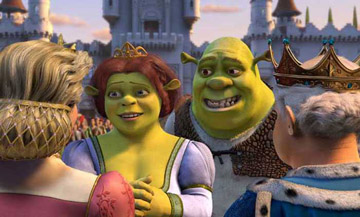Top 12 Film Industry Stories of 2008:
#4: The Dream(Works) Is Over. Again.
By David Mumpower
January 14, 2009
In 1994, three of the most powerful men in Hollywood attempted to defy the conventional wisdom. The long-standing belief was held that a new studio could not ever gain a level playing field in the movie exhibition oligopoly. What made the trio trying to challenge this premise so novel was that they were all on the short list of the most powerful men in Hollywood.
Steven Spielberg, the director of some of the most lucrative projects in the industry's history, brought the creativity. Jeffrey Katzenberg, previously the Chief Operating Officer at Disney, had the experience in how to greenlight a full production slate. And David Geffen was the Mr. Moneybags who had parlayed his knowledge of the music industry into multi-billion dollar success with Geffen Records. These three men offered experience in all three major phases of the movie-making process. Spielberg would come up with the ideas, Katzenberg would get the movies financed and made, and Geffen would take another company go from the ground floor to the penthouse in record time. This was the plan in 1994 and it almost worked.
In examining the titles of DreamWorks, there are two aspects to examine. On the one front are the live action titles they released starting with The Peacemaker in 1997. The company had its fair share of success on this side, although their accomplishments probably didn't get the glowing press that they should. That's the problem with unreasonable expectations. Defining what is enough to qualify something as acceptable varies from person to person. With three of the biggest names in the industry running DreamWorks, opinions on "enough" were all over the place, but DreamWorks won an Academy Award for Best Picture only two years after its first release when American Beauty claimed the industry's biggest prize. They followed this remarkable feat by sharing two more Best Picture titles with Universal for Gladiator and A Beautiful Mind. Within seven years of the creation of DreamWorks, they had won three different Best Picture Oscars. If that's not success, we need to re-examine the word's definition.
The problem with the live action side of DreamWorks is that it was always living in the shadow of the animated side. Due to Katzenberg's experience running Disney's film division, he knew how animators thought and he offered them a rare opportunity for competition in the industry. Previously, had they not been comfortable at Disney, well, theirs was a take it or leave it profession for the most part. Disney had a de facto monopoly on the animation world. With the advent of DreamWorks, new opportunities arose for those who were not satisfied with their current job. The end result was that DreamWorks Animation had an advantage that the other side of the company never did. It became only the second fish in a two fish pond. Whereas DreamWorks live action productions faced the struggles all fledgling mid-majors do as they try to compete with the big boy, DreamWorks Animation was by default such a big boy right from the start. The results spoke for themselves.
Continued:
1
2
3
4

![]() Tweet
Tweet
![]() Print this column
Print this column



